Maya’s inspiring journey of hope, strength and overcoming childhood cancer
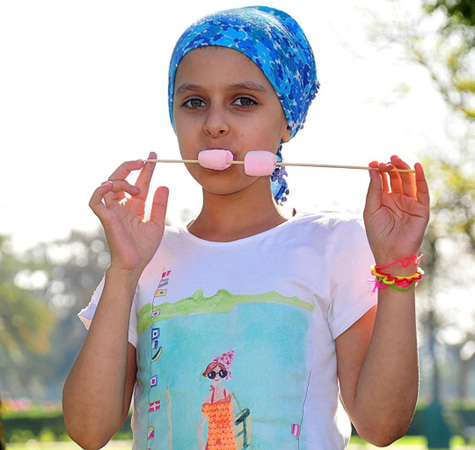 Maya in 2012. She was 10 years old when she started cancer treatment. Photo credit: BASMA23 July 2024 – In Syria, childhood cancer is ranked third among the leading causes of death in the country. Damascus and its suburbs are the main areas where cancer treatment is offered, putting huge pressure on hospitals here to admit children from across Syria. Despite the ever-shrinking availability of cancer services across the country, a network of dedicated organizations and health workers continue to strive to provide life-saving care.
Maya in 2012. She was 10 years old when she started cancer treatment. Photo credit: BASMA23 July 2024 – In Syria, childhood cancer is ranked third among the leading causes of death in the country. Damascus and its suburbs are the main areas where cancer treatment is offered, putting huge pressure on hospitals here to admit children from across Syria. Despite the ever-shrinking availability of cancer services across the country, a network of dedicated organizations and health workers continue to strive to provide life-saving care.
Maya, a young cancer survivor, shares her story, which reflects her patience, strength and an unbreakable spirit of hope.
Maya’s story, in her own words
When I was just 10 years old, my brother and I were playing a game of wrestling in our home in As-Sweida, Syria. I felt a lump in my abdomen, but what seemed like normal stomach pain turned out to be something far more serious. The next day, a CT [computed tomography] scan revealed the shocking news: I had cancer. The diagnosis was abdominal sarcoma, specifically a desmoplastic small round cell tumour. This was July 2012, and the start of a challenging journey.
My mother and I went to Al-Biruni University Hospital in the Harasta suburbs outside of Damascus to begin my treatment. By chance, we found the BASMA association on one of the hospital floors where they treat children with cancer. My mother spoke with the doctors, and soon I was admitted into BASMA’s care to start my treatment.
To receive my chemotherapy doses, my mother and I had to travel each time from As-Sweida back to the hospital in Harasta. This journey was terrifying – the road was deadly, filled with bombings and snipers. But I had no choice, I couldn’t give up.
My treatment was complex. I had surgery for my chemotherapy to be given through a port because my arteries had hardened. The pain of each dose was immense, like a fire burning inside me. Isolation became my new reality as my immune system weakened, and I was cut off from the world and school. Every time I visited the hospital, I would see other children battling their own challenges. I often wondered why I had survived and what purpose my life now held.
The year 2015 marked one of the most beautiful moments of my life – 3 years after this journey began, I learned I was in remission. My condition improved.
There was, however, a heavy cost. Because of the cancer treatment, I can never be a mother. This reality is painful, but I have decided to remain strong.
Today, at 24 years old, I look back on that time with gratitude. I graduated from the faculty of business administration with a score of 99% and I am now in my second year of studying media. My ambitions are boundless. I speak at TEDx, volunteer with BASMA and the Syrian Arab Red Crescent, and cherish my Syrian heritage.
WHO’s ongoing support to BASMA
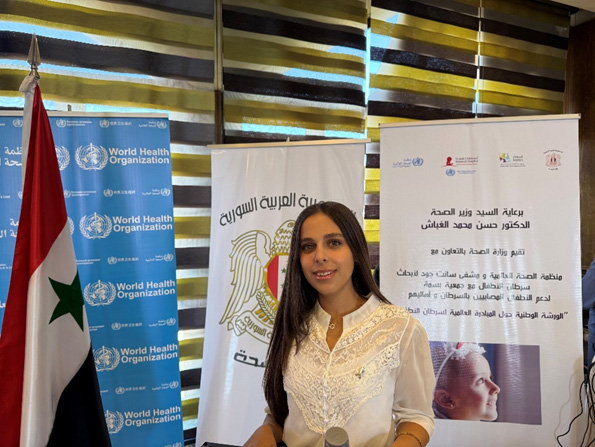 Maya in 2024. With her cancer in remission since 2015, her ambitions are boundless. Photo credit: WHO/WHO SyriaIn 2024, WHO’s support to BASMA aims to provide comprehensive care for children with cancer, like Maya, and encompasses both medical and psychosocial aspects. The initiative emphasizes the importance of holistic support: the social, psychological, spiritual and functional dimensions are crucial during the treatment process, and upon recovery, while patients face a gradual return to daily life.
Maya in 2024. With her cancer in remission since 2015, her ambitions are boundless. Photo credit: WHO/WHO SyriaIn 2024, WHO’s support to BASMA aims to provide comprehensive care for children with cancer, like Maya, and encompasses both medical and psychosocial aspects. The initiative emphasizes the importance of holistic support: the social, psychological, spiritual and functional dimensions are crucial during the treatment process, and upon recovery, while patients face a gradual return to daily life.
In the past 5 years, with generous donations from Japan and Kuwait, WHO has provided BASMA with advanced diagnostic medical equipment to enhance cancer treatment. This support includes 2 polymerase chain reaction (PCR) machines and 2 safety cabinets, 30 chemotherapy beds, anaesthesia machines, a spectrophotometer for chemistry tests, a haematology analyser, and a flow cytometer for treatment follow-up.
These contributions have significantly strengthened BASMA’s capacity, enabling the association to double the number of children it is able to admit annually.
WHO and BASMA are working to scale up this initiative over the years to come, to ensure that all children with cancer in Syria can access life-saving care, wherever they live.
WHO and Japan transform Al-Qamishli National Hospital in north-east Syria amid growing health crisis
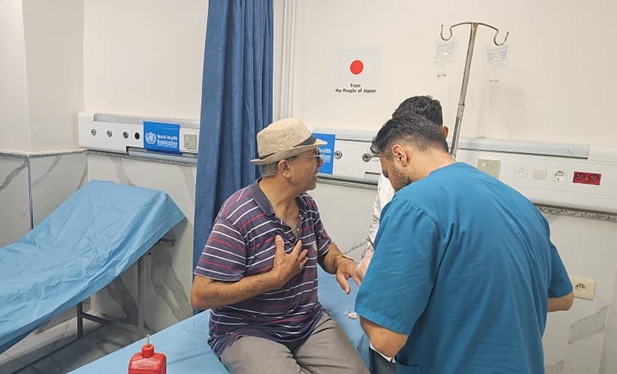 A beneficiary of the project receives health services at Al-Qamishli National Hospital. Photo credit: WHO/WHO Syria
A beneficiary of the project receives health services at Al-Qamishli National Hospital. Photo credit: WHO/WHO Syria
16 July 2024, Syria – WHO proudly announces the official handover of key units in Al- Qamishli National Hospital, north-east Syria, to the Ministry of Health. This follows their rehabilitation as part of the Project for Strengthening Health Care Services. This initiative, supported by the people of Japan, aims to improve the resilience and sustainability of health facilities in Syria.
During the one-year rehabilitation project, the main focus was to rehabilitate the burns care, intensive care, emergency, dialysis, and medical imaging units of Al-Qamishli National Hospital. Outdated medical equipment was also upgraded to better serve the community.
Amid a deepening health crisis in the region, the reopening of the units marks an important milestone in delivering essential medical assistance to the community. Local people have been increasingly affected by the ongoing crisis and the lack of access to health care.
Al-Qamishli National Hospital is one of 16 public hospitals in north-east Syria, most of which are either partially functional or out of service. The two-storey complex has a 200-bed capacity and functions as the main referral hospital in the area. Overburdened since the start of the crisis in Syria, it required major rehabilitation. Prior to the project, the hospital served an estimated 200 000 patients a year. This number is expected to increase following the improvements.
As Dr Iman Shankiti, WHO Representative to Syria, thanked the people of Japan for their partnership and highlighted the project’s broader impact on north-east Syria’s health system: “This project represents a major achievement in our ongoing efforts to improve access to advanced medical care services, particularly in underserved areas. We will be able to provide better health services and improve the lives of thousands in north-east Syria.”
Mr Adam Abdelmoula, United Nations Resident Coordinator and Humanitarian Coordinator for Syria, echoed her sentiments and added, “It is imperative that the services in this hospital are made accessible to all people living in Al-Hassakeh governorate and the surrounding areas.”
The relaunch of Al-Qamishli National Hospital comes at a critical time. The health system in north-east Syria must contend with significant challenges, including instability, leading to shortages of medical supplies, health workers and functional infrastructure.
Through the project, various items of medical equipment were procured and distributed to the hospital to improve its diagnostic capabilities. This equipment includes a computed tomography (CT) scanner, magnetic resonance imaging (MRI) machine, colour Doppler ultrasound scanner cardiac diagnostic machine, C-arm machine, X-ray unit for the operating theatre and a mobile digital radiographic X-ray unit.
Further, the fully renovated dialysis unit now features 6 new dialysis machines and a water treatment station. Moreover, the hospital’s 3 laboratories – for the emergency department and outpatient clinics, and the central laboratory – have received new equipment to enhance diagnostic services.
WHO concerned about health situation in Al Hol camp, Northeast Syria, following denials of access by camp administration
9 June 2024, Cairo/Damascus -- The World Health Organization (WHO) is deeply concerned about the health situation in Al Hol Camp in Al-Hasakeh, Northeast Syria. Today marks one month since WHO’s field staff were denied access to the camp by the Camp Administration. This reportedly follows WHO’s decision to suspend hospital referrals for displaced people in the camp due to funding shortages.
Despite using all available channels of communication Camp Administration and relevant authorities, including persistent advocacy efforts through the United Nations Office for the Coordination of Humanitarian Affairs (UNOCHA), donors and Member States. However, the Organization’s access has not been restored.
The resulting situation directly endangers the lives and well-being of the vulnerable camp population and potentially exposes them to severe public health risks, including disease outbreaks which may increase during warmer months.
WHO reiterates its commitment to vulnerable populations. The Organization is maintaining its efforts to mobilize resources and restore critical services to the camp, including working with donors who are actively seeking to close the funding gap.
WHO’s humanitarian health activities in Al Hol camp extend beyond hospital referrals. Its services include health sector coordination, routine immunization, risk communication and community engagement (RCCE), water quality monitoring, disease surveillance and early warning, delivery of medical supplies, technical health expertise, and capacity building for health workers.
WHO urgently calls on its partners and the international community to support and advocate with relevant stakeholders in Northeast Syria to immediately restore WHO’s access to Al Hol camp. Unconditional access is essential for WHO to deliver on its public health mandate and mitigate the significant health risks in this already vulnerable setting.
Syrian Ministry of Health and WHO partner on action plan for NCDs
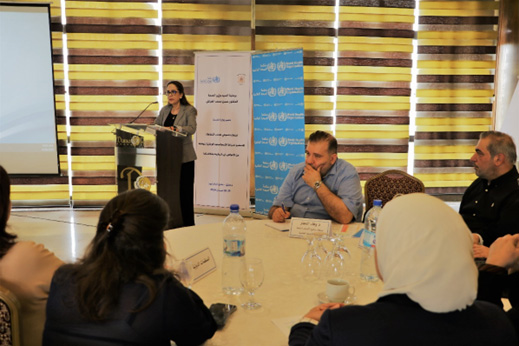 The Syrian Ministry of Health and WHO collaborate on the National Multi-Sectoral Action Plan for prevention and control of NCDs. Photo credit: WHO Syria30 April 2024, Damascus, Syria – In collaboration with the Syrian Ministry of Health, WHO conducted a central meeting from 29 to 30 April to prepare the National Multi-Sectoral Action Plan for prevention and control of noncommunicable diseases (NCDs). Chronic conditions, including cardiovascular diseases, diabetes, respiratory conditions, cancer and mental health disorders, are responsible for an estimated 50–70% of all deaths in Syria.
The Syrian Ministry of Health and WHO collaborate on the National Multi-Sectoral Action Plan for prevention and control of NCDs. Photo credit: WHO Syria30 April 2024, Damascus, Syria – In collaboration with the Syrian Ministry of Health, WHO conducted a central meeting from 29 to 30 April to prepare the National Multi-Sectoral Action Plan for prevention and control of noncommunicable diseases (NCDs). Chronic conditions, including cardiovascular diseases, diabetes, respiratory conditions, cancer and mental health disorders, are responsible for an estimated 50–70% of all deaths in Syria.
The Action Plan is in line with WHO’s regional and global frameworks and aims to promote healthy lifestyles and address the rising prevalence of chronic diseases by targeting risk factors such as tobacco use, unhealthy diet, physical inactivity, harmful alcohol consumption and exposure to air pollution.
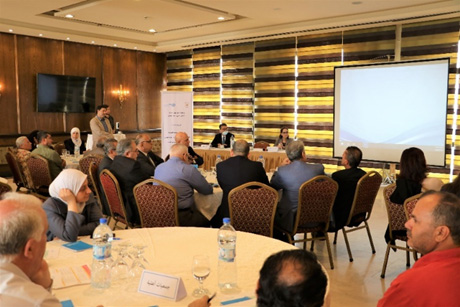 Representatives of the Syrian Ministry of Health and WHO discuss the National Multi-Sectoral Action Plan for prevention and control of NCDs. Photo credit: WHO SyriaDr Iman Shankiti, acting WHO Representative to Syria, said, “This comprehensive strategy prioritizes collaboration among relevant sectors to analyse the current situation, develop a multisectoral national plan and implement joint planning, implementation, monitoring and evaluation to minimize population exposure to preventable risk factors. In the end, we aim to address one of the biggest threats to mortality and morbidity in the country, ensuring better health and longer lives for all people in Syria.”
Representatives of the Syrian Ministry of Health and WHO discuss the National Multi-Sectoral Action Plan for prevention and control of NCDs. Photo credit: WHO SyriaDr Iman Shankiti, acting WHO Representative to Syria, said, “This comprehensive strategy prioritizes collaboration among relevant sectors to analyse the current situation, develop a multisectoral national plan and implement joint planning, implementation, monitoring and evaluation to minimize population exposure to preventable risk factors. In the end, we aim to address one of the biggest threats to mortality and morbidity in the country, ensuring better health and longer lives for all people in Syria.”
At the meeting, participants discussed critical topics, including the need for a national strategy on NCD prevention and control and chronic diseases management. The group also discussed the role of WHO and stakeholders in addressing significant challenges and fostering partnerships to advance health care in Syria, using the life-course approach. This approach aims to improve health outcomes by addressing social, economic and environmental determinants of health across different stages of life, from prenatal care through to older age.
Related links
Noncommunicable diseases: Regional framework for action
Global Coordination Mechanism on the Prevention and Control of NCDs


